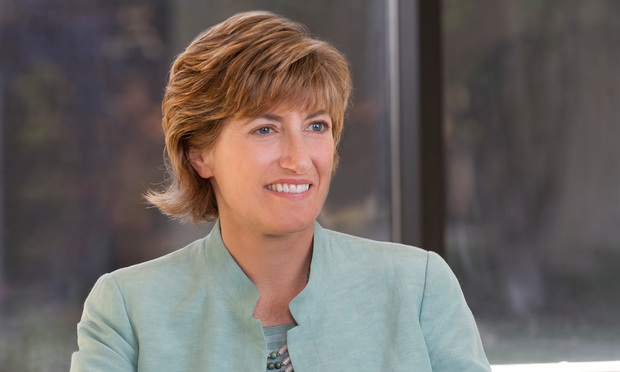Women Leaders in Tech Law: Judith Hasko, Latham & Watkins
Hasko represented Japan's Daiichi Sankyo Co. in a global agreement to co-develop and commercialize a new antibody-drug product to treat cancer.
October 29, 2019 at 01:00 PM
3 minute read
 Judith Hasko, Latham & Watkins. (Courtesy photo)
Judith Hasko, Latham & Watkins. (Courtesy photo)
Judith Hasko, the vice chair of the health care and life sciences practice at Latham & Watkins, represented Japan's Daiichi Sankyo Co. in a $6.9 billion global agreement with AstraZeneca to co-develop and commercialize a new antibody-drug product for cancer treatment. Hasko, who is being recognized as one of 21 Women Leaders in Tech Law as part of The Recorder's California Leaders in Tech Law and Innovation Awards, recently reflected on her accomplishments of the past year.
What's your proudest professional achievement of the past year and why?
I am proud to have advised clients on several special, complex transactions to enable treatments for critical human diseases, such as Daiichi's collaboration with AstraZeneca to develop an antibody-drug conjugate for use in many types of cancer, Agenus' collaboration with Gilead to progress up to five potential treatments for cancer, and Tizona's strategic alliance with AbbVie to develop antibodies targeting a particular cancer-related molecule. My clients put their talents, energy and funding into creating opportunities for novel therapies, and I am able to assist them in obtaining additional significant funding and complementary capabilities and expertise through collaborations.
What's your proudest personal achievement of the past year and why?
In addition to the personal gratification I get from completing a deal for an innovative client, I also had a major family achievement recently: Organizing a destination birthday celebration for my husband with 12 other family members traveling from four states, without losing anyone or their luggage en route. It was a huge effort but led to a wonderful experience creating lifelong memories for all attending.
What's one piece of advice you'd give to a woman starting out in tech law?
Find an area of technology law that motivates you, and then learn as much as you can from more experienced attorneys about how to become a trusted legal counsel, and from your clients about their business and goals. Tech law is challenging because it requires understanding the relevant technology and the clients' operating environment while developing the ability to provide solid legal counsel in an ever-changing technical and legal world. But importantly, it is a fun and rewarding area of law so try it out!
What concrete steps could be made to increase the number of women in tech law?
There are many steps that could make a difference. Reaching out to law schools to identify women law students inclined toward technology-related interests, and enabling them to understand the practice and encouraging them to pursue tech law. Senior attorneys can provide opportunities for more junior women attorneys to explore directly the practice and demonstrate their abilities through engagement on a range of transactions with various types of clients. Companies and firms can provide support for diversity and inclusion programs, and career guidance and mentoring programs.
This content has been archived. It is available through our partners, LexisNexis® and Bloomberg Law.
To view this content, please continue to their sites.
Not a Lexis Subscriber?
Subscribe Now
Not a Bloomberg Law Subscriber?
Subscribe Now
NOT FOR REPRINT
© 2025 ALM Global, LLC, All Rights Reserved. Request academic re-use from www.copyright.com. All other uses, submit a request to [email protected]. For more information visit Asset & Logo Licensing.
You Might Like
View All



'Pull Back the Curtain': Ex-NFL Players Seek Discovery in Lawsuit Over League's Disability Plan
Trending Stories
- 1Uber Files RICO Suit Against Plaintiff-Side Firms Alleging Fraudulent Injury Claims
- 2The Law Firm Disrupted: Scrutinizing the Elephant More Than the Mouse
- 3Inherent Diminished Value Damages Unavailable to 3rd-Party Claimants, Court Says
- 4Pa. Defense Firm Sued by Client Over Ex-Eagles Player's $43.5M Med Mal Win
- 5Losses Mount at Morris Manning, but Departing Ex-Chair Stays Bullish About His Old Firm's Future
Who Got The Work
J. Brugh Lower of Gibbons has entered an appearance for industrial equipment supplier Devco Corporation in a pending trademark infringement lawsuit. The suit, accusing the defendant of selling knock-off Graco products, was filed Dec. 18 in New Jersey District Court by Rivkin Radler on behalf of Graco Inc. and Graco Minnesota. The case, assigned to U.S. District Judge Zahid N. Quraishi, is 3:24-cv-11294, Graco Inc. et al v. Devco Corporation.
Who Got The Work
Rebecca Maller-Stein and Kent A. Yalowitz of Arnold & Porter Kaye Scholer have entered their appearances for Hanaco Venture Capital and its executives, Lior Prosor and David Frankel, in a pending securities lawsuit. The action, filed on Dec. 24 in New York Southern District Court by Zell, Aron & Co. on behalf of Goldeneye Advisors, accuses the defendants of negligently and fraudulently managing the plaintiff's $1 million investment. The case, assigned to U.S. District Judge Vernon S. Broderick, is 1:24-cv-09918, Goldeneye Advisors, LLC v. Hanaco Venture Capital, Ltd. et al.
Who Got The Work
Attorneys from A&O Shearman has stepped in as defense counsel for Toronto-Dominion Bank and other defendants in a pending securities class action. The suit, filed Dec. 11 in New York Southern District Court by Bleichmar Fonti & Auld, accuses the defendants of concealing the bank's 'pervasive' deficiencies in regards to its compliance with the Bank Secrecy Act and the quality of its anti-money laundering controls. The case, assigned to U.S. District Judge Arun Subramanian, is 1:24-cv-09445, Gonzalez v. The Toronto-Dominion Bank et al.
Who Got The Work
Crown Castle International, a Pennsylvania company providing shared communications infrastructure, has turned to Luke D. Wolf of Gordon Rees Scully Mansukhani to fend off a pending breach-of-contract lawsuit. The court action, filed Nov. 25 in Michigan Eastern District Court by Hooper Hathaway PC on behalf of The Town Residences LLC, accuses Crown Castle of failing to transfer approximately $30,000 in utility payments from T-Mobile in breach of a roof-top lease and assignment agreement. The case, assigned to U.S. District Judge Susan K. Declercq, is 2:24-cv-13131, The Town Residences LLC v. T-Mobile US, Inc. et al.
Who Got The Work
Wilfred P. Coronato and Daniel M. Schwartz of McCarter & English have stepped in as defense counsel to Electrolux Home Products Inc. in a pending product liability lawsuit. The court action, filed Nov. 26 in New York Eastern District Court by Poulos Lopiccolo PC and Nagel Rice LLP on behalf of David Stern, alleges that the defendant's refrigerators’ drawers and shelving repeatedly break and fall apart within months after purchase. The case, assigned to U.S. District Judge Joan M. Azrack, is 2:24-cv-08204, Stern v. Electrolux Home Products, Inc.
Featured Firms
Law Offices of Gary Martin Hays & Associates, P.C.
(470) 294-1674
Law Offices of Mark E. Salomone
(857) 444-6468
Smith & Hassler
(713) 739-1250






